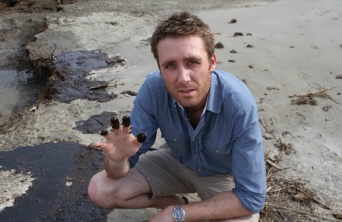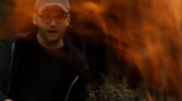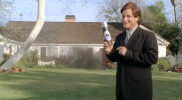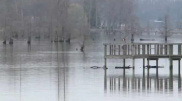Philippe Cousteau Jr. Joins The Intervention
Philippe Cousteau Jr. may come from a long line of environmentalists, but he doesn’t rest on his family’s laurels.
From leading science expeditions in the Arctic north, to surveying the Gulf of Mexico’s oil spill, Cousteau is an advocate for planet Earth. Through his travels, he says he has come into contact with what he believes to be the primary damage non-renewable energy is doing to our planet: climate change.
However, for as many problems as he sees, Cousteau says that solutions are also within sight.
One solution lies in teaching. Through Earth Echo International, his education and environment nonprofit, he aims to incite change by informing the next generation on how and why to take charge of the future of the planet and change unsustainable habits.
Currently, he is gathering resources and tools for educators to get that message to school kids across the country through the “Water Planet Challenge.” Calling classrooms to action, Cousteau’s organization provides lesson plans, videos, and guides to get students thinking about clean energy and water.
Cousteau took a break to speak with Counterspill and answer a few questions. He offered his views on what we’re doing wrong, what we’re doing right, and why saying “you can make a difference” is only half true.
CS: Based on what you’ve seen in your travels, how is our planet’s water holding up?
Well I think it’s impossible to talk about that without mentioning climate change. And it’s not about what climate change might do to water systems, it’s that climate change is water systems. In terms of what it’s doing to fresh water, in terms of droughts, volatility of weather patterns, in many terms it has a parallel significance to all of these things. In studying organisms, we can see that the changes in their environment -- namely the water in which they live -- make a big difference or hinders their ability to make their shells. Those are all carbon-related problems that are associated with water. And carbon-related problems mean we are getting closer and closer to a perilous existence. It’s not a secondary impact, it is the primary impact and it affects all of us.
CS: What’s the first step toward a sustainable future?
I think it has to do with diversification. It’s usually a good model of business and it’s also a good solution when it comes to energy. We’re not going to get off of oil or coal. What we have to realize is that we don’t have a diversified portfolio so that we can introduce more and more renewable energy into the mix.
CS: What technologies should we start introducing?
I’m very excited about offshore wind. I think that it has a lot of potential and it’s something I think people are wrong to impose on the grounds of whether or not it’s attractive, which is a big debate brewing in Massachusetts. You can see these windmills but you can’t always see the damage that pollution does. It may not be as obvious as a windmill, but non-renewable energy is killing us -- literally. What people have to understand is that if its not offshore wind, it’s going to be something else. And that ‘something else’ can’t be non-renewable energy.
CS: What about the “high costs” of moving to renewable energy sources?
We like to claim that we live in a free market economy and that it’s the capitalist system. But when it comes to our energy, that’s not the case at all. The price we pay at the pump does not reflect the true price of what we actually pay per gallon of gas because of direct subsidies and indirect subsidies for fossil fuel. Renewable energy, as it currently is, makes it impossible to compete. Not just because of the outright subsidies, but also hidden subsidies [of non-renewable energy]. We have to remind people that they do pay for it in indirect ways.
If those costs were factored into the true price it would change the dynamic in terms of balancing what we perceive to be a high cost of renewable energy to the low cost of nonrenewable forms of energy, when in fact one can argue that it could be cheaper if we didn’t factor in the subsidies and the cost it is bringing to human life. No one ever died from a wind spill, no one ever died from a sun spill -- yet we see the damage done through oil spills and how in some parts of the country, kids can’t even go outside and play because of what coal does to air.
CS: Do you think people oppose renewable energy because of a lack of accessible information?
The information is there, but a lot of people just choose not to see it. It’s very scary. They might know about it, but they don’t trust it. There is the big problem: we are losing an important skill in this country and that is critical thinking. There’s a very blurred line in our national media and in our national discourse between information and entertainment. There’s a great quote from Ted Koppel where he says, “We don’t get the news we need, we get the news we want.” I think that’s very true.
CS: Have you seen any success changing that mindset in youths?
I’ve seen young kids around the country that are so engaged -- so excited. I remember when I was in high school; now they have corporate programs, green clubs, carbon footprint programs going on, kids competing together at state and nationwide competitions. It’s gaining ground and so many more students are required to become service-oriented as a part of their curriculum.
I remember three middle-school boys from the state of Iowa we worked with two years ago. They loved cars and they did some research and they found out that the lead fuel we use in cars contributes to a dramatic amount of air pollution in this country. So, they actually contacted lawmakers in Iowa and worked along with the legislature to talk about limiting the use of lead fuel in government-owned cars. This is something they did in their spare time. I think that it’s a great example of many where kids see the need for action because the adults aren’t doing it.
CS: What are Earth Echo’s next steps with its “Water Planet Challenge”?
We’re working on rallying national participation and putting together resources for kids and teachers. Right now, we are launching a whole lot of content on energy efficiency. Speaking of technologies -- if we just looked into energy efficiency it’d save us money, and provide jobs. So we’re launching a national energy efficiency campaign to get kids involved.
CS: Speaking of getting people involved, we’d like to ask: what do you think is one thought or idea that that could change the world if everyone knew it?
You know that saying, “you can make a difference”? It’s only half true. It’s really that every thing you do makes a difference. I think that it’s a paradigm shift and a behavior shift.
So just recognize that every decision, all the little things, make a difference every day.






